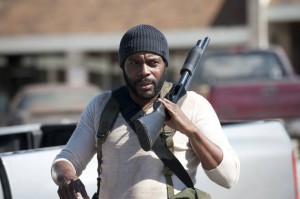Sacrifices – The Walking Dead Review
Review of The Walking Dead 403 – Isolation
 Being alone is rarely a pleasant thing. Humans crave contact with others, need the interaction to keep themselves happy and mentally healthy. Finding companionship in the zombie apocalypse is next to impossible. From what we’ve learned on the show since day one, human nature demands that most folks take care of numero uno first, then their family. If you’re a stranger, kindness has to be earned. Even after making that vital, living connection, there are moments when a person may find themselves surrounded by others, yet utterly isolated by circumstances no one else can understand. This week on “The Walking Dead” we saw a lot of people suffering on their own, forced to make terrifying personal sacrifices in order to keep one step ahead of not only the walkers, but also the illness plaguing the prison population.
Being alone is rarely a pleasant thing. Humans crave contact with others, need the interaction to keep themselves happy and mentally healthy. Finding companionship in the zombie apocalypse is next to impossible. From what we’ve learned on the show since day one, human nature demands that most folks take care of numero uno first, then their family. If you’re a stranger, kindness has to be earned. Even after making that vital, living connection, there are moments when a person may find themselves surrounded by others, yet utterly isolated by circumstances no one else can understand. This week on “The Walking Dead” we saw a lot of people suffering on their own, forced to make terrifying personal sacrifices in order to keep one step ahead of not only the walkers, but also the illness plaguing the prison population.
Spoiler Warning: This review contains potential spoilers. If you aren’t caught up with the show, what are you waiting for?
The graveyard in the prison yard is larger than the garden. That alone speaks volumes about the harshness of life for the characters on the show. By the time this illness plays out, many others will join the dead already in the ground. At some point, they’ve stopped creating new life and instead focus on tending to those who’ve passed. Rick tried to convey the importance of focusing on the living to Tyrese, explaining how his time was better spent securing their future food sources than looking into the past and crippling himself with their losses—a rare moment for Rick considering how far afield his mind wandered last season after losing his wife, Lori. Is justice something that even factors into their world? How far can it go toward righting wrongs in a lawless world full on unnecessary death? Tyrese is uneasy killing walkers, even those who are an immediate threat to his survival, yet he demands the head of whoever killed two of their own. We’re seeing a turning point in his life. He’s consumed by rage, becoming a different man. Rick is still on that road and no longer recognizes himself, especially after his fight with Tyrese. What will Tyrese do when he learns the truth? Venturing too far down that road leads to trouble.
Glenn wishes he could move on into the future. He’s never been one to linger in the past, with the exception of Maggie’s abuse at the hands of the Governor. The couple have been the poster children for a promising future since they finally got over that awkward relationship stage in season two. Despite all odds, they found love. They’re planning to marry. At some point, Maggie wants to start a family—when Glenn feels it is safe enough to birth and raise children. Everything they do is focused on tomorrow, what it could bring in the way of happiness and an end to their troubled times. The two of them aren’t stupid. Nothing is going to be fixed overnight. And now, the bright lives ahead of them are in trouble. Glenn is sick and without him to keep her grounded, Maggie turns to her family. Only they’ve been separated from her because of the illness.
The Greene family firmly believe in duty above all. If there is any way they can be of help to their fellow survivors, they do it. Maggie remains on duty as a council member and one of the guards while everyone she cares for is taken away from her. Beth has grown in leaps and bounds emotionally since leaving the farm and accepting the reality of their world. She doesn’t behave like a teenager, takes responsibilities no one should ever ask from someone her age. Would anyone so young willingly be locked away from her loved ones to care for a child who isn’t part of her blood family? Not only that, Beth has learned to accept her father’s calm demeanor. She’s become the voice of reason for the family, allowing Maggie and Hershel to act in instinct—something their positions on the council require. There’s not a lot of time to think when one threat to their survival will eat them alive, and the other takes no prisoners and cannot be stopped in a world where modern healthcare is as rare as a unicorn. Hershel sets the bar for honor and sacrifice for his girls when he willingly walks into the quarantined section of the prison to care for the sick, knowing full well the medicine they need may come in a day, or a week—there are no guarantees in their world.
 “We don’t know if we get a tomorrow.” Unlike Glenn and Maggie, Carol is not as convinced they can make everything work in their favor. She’s stood by, quietly caring for everyone under their roof as she’s always done. But there came a point when she knew it wasn’t enough. Being the quiet, motherly figure wouldn’t keep the children from getting sick. Wouldn’t provide the water they need to keep going on into a future she can’t even fathom at this point. Her hand aren’t tied by the position she’s in with the council. At one point or another, they’ve all done horrific things to protect the group. In this episode, we saw just how far Carol would go. Her transformation throughout the series is astounding. We met Carol when she was broken, powerless in the face of her husband’s abuse. After she lost her daughter, her only living relation, she adopted the group as her new family. Some of the impotent rage she suffered then, simmering over the weeks spent searching for Sophia, blew up this week. She went to the dark place and gathered that rage close in order to do what she thought necessary to protect everyone. Only time will tell if it changed her like Rick’s kills changed him, and Tyrese’s rage is beginning to morph him into a colder man.
“We don’t know if we get a tomorrow.” Unlike Glenn and Maggie, Carol is not as convinced they can make everything work in their favor. She’s stood by, quietly caring for everyone under their roof as she’s always done. But there came a point when she knew it wasn’t enough. Being the quiet, motherly figure wouldn’t keep the children from getting sick. Wouldn’t provide the water they need to keep going on into a future she can’t even fathom at this point. Her hand aren’t tied by the position she’s in with the council. At one point or another, they’ve all done horrific things to protect the group. In this episode, we saw just how far Carol would go. Her transformation throughout the series is astounding. We met Carol when she was broken, powerless in the face of her husband’s abuse. After she lost her daughter, her only living relation, she adopted the group as her new family. Some of the impotent rage she suffered then, simmering over the weeks spent searching for Sophia, blew up this week. She went to the dark place and gathered that rage close in order to do what she thought necessary to protect everyone. Only time will tell if it changed her like Rick’s kills changed him, and Tyrese’s rage is beginning to morph him into a colder man.
Too many lives hang in the balance. It is impossible to figure out what will happen next on this show. Daryl, Michonne, Tyrese, and Bob are on foot, surrounded by thousands of walkers. We have no clue how many folks in the prison are sick, or will be sick and waiting for medicine that may never arrive. How long can the remaining council keep them safe and healthy with two of their best fighters in the field?
Did Carol go too far in this week’s episode? Could you have done what she did? If not, what would you have done differently to stay one step ahead of the illness in the prison?
